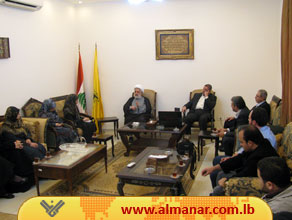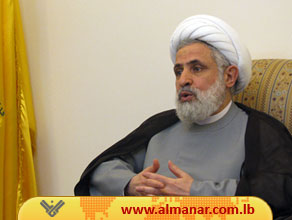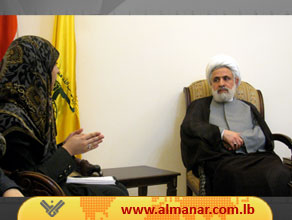Al-Manar website team met Thursday with Hezbollah Deputy Secretary General Sheikh Naim Qassem who presented Hezbollah’s vision on the latest regional and local developments and answered the questions of the team.
Al-Manar website team met Thursday with Hezbollah Deputy Secretary General Sheikh Naim Qassem who presented Hezbollah’s vision on the latest regional and local developments and answered the questions of the team over this transitional phase.
 At first, Sheikh Qassem raised the Syrian issue, considering that International Envoy Kofi Annan’s plan “is a direct indication to the failure of the policies that the Arabs and the West adopted lately.”
At first, Sheikh Qassem raised the Syrian issue, considering that International Envoy Kofi Annan’s plan “is a direct indication to the failure of the policies that the Arabs and the West adopted lately.”
“There had been a political solution to the crisis in Syria, which the Western and some Arab states excluded…” he said, indicating that the new Syrian scene does not enable the West to have a role in the country.
“This scene is summarized by the failure of the armed opposition in changing the balance of power on ground, the failure of the Western countries in militarily bringing down a regime, and the ability of the regime to reveal public support through referendum on constitution and to stand firm before this great foreign conspiracy that aimed at defeating the resistance.”
Sheikh Qassem went on saying: “Based on that, I consider that raising Annan’s plan is by itself a transition to a totally new phase, which is based on finding a political solution that is not based on toppling the regime. This political solution requires some time.”
As he indicated that some Arab and Western states’ collusion against Syria was not over, he said that “they are waiting to see the outcome of the economic pressure as well as the changes in the region, which could be used as another kind of political pressure. The conspiracy against Syria did not end, but this type of confrontation faced obstacles, and this urged a tactical retreat.”
 “We are waiting for the opposition and the countries supporting it to present an appropriate solution rather than taking negative actions. Any negative action would not work because the regime is firm,” he added.
“We are waiting for the opposition and the countries supporting it to present an appropriate solution rather than taking negative actions. Any negative action would not work because the regime is firm,” he added.
Hezbollah deputy secretary general further pointed out that there were not splits in the composition of the army and security forces in Syria…. “This raises the question: Did it draw your attention that none of the employees in the Syrian embassies around the world left his job.”
During the meeting, the case of Al-Jadeed cameraman, Ali Shaaban, who was lately martyred on the Lebanese, Syrian borders, was tackled, and Sheikh Qassem denied that Hezbollah is being acquainted with the final investigations.
“The problem is not confined to knowing the perpetrator. The motives, circumstances, and responsible parts should be uncovered, and all these facts are not clear yet,” he said, clarifying that “we did not contact the Syrian leadership. There are certain Lebanese sides that are concerned with the investigations.”
 Regarding the arms smuggling on the Lebanese, Syrian borders, Sheikh Qassem emphasized that “the Lebanese army is responsible for this issue and Hezbollah has nothing to do with the security or the military actions on the borders… but there are some sides in Lebanon that publicly state that they want Lebanon to be a crossing for riot in Syria, and these sides are smuggling money and arms.”
Regarding the arms smuggling on the Lebanese, Syrian borders, Sheikh Qassem emphasized that “the Lebanese army is responsible for this issue and Hezbollah has nothing to do with the security or the military actions on the borders… but there are some sides in Lebanon that publicly state that they want Lebanon to be a crossing for riot in Syria, and these sides are smuggling money and arms.”
The website team asked Hezbollah deputy secretary general about the internal situation, especially as the party is being criticized over its performance in the government.
Here, Sheikh Qassem said that “the political structure, starting with the parliamentary elections, government formation, law legislation, and other services, requires the approval of all the concerned parts, for taking any decision is subject to religious and sectarian considerations, as well as personal benefits. Hezbollah is not open-handed; it is rather a part of group. It is wrong to say that Hezbollah did not change the internal equation, because any change or improvement in the internal equation cannot be accomplished by one part.”
As for the relation between Hezbollah and the Islamic Resistance in Palestine, Hamas, especially after the crisis in Syria, Sheikh Qassem asserted that “our relation with Hamas movement is persistent, and is based on confronting the Israeli enemy. We don’t interfere in our allies’ stances. What concerns us is that the basic common standards remain, and this is present with Hamas, which we are constantly communicating and holding public meetings with.”
“We don’t think that there is a change in Hamas’s stance from the Israeli enemy. Hamas is still in the resistance position,” he added.